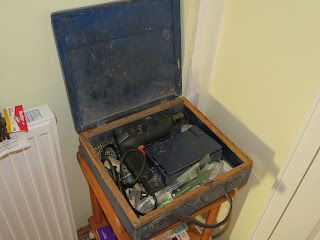When My Dad Retired (1979)
He left the UK to return to Ireland and my mother went with him, even though she didn't much want to go. The whole experience didn't work out well and they were back in the UK in around 18 months.
He'd been a school-caretaker since the late 1940's/early 1950's and he began what turned out to be his final caretaking job in 1962, the first caretaker at one of Birmingham's flagship comprehensive schools, Perry Common Comprehensive. So, when he left in 1979 an appropriate and respectful series of celebrations and presentations took place. He'd been asked what he wanted as a retirement gift and had replied that he wanted some DIY tools, including a two-speed, hammer action Black & Decker drill. They'd bought a house in the countryside between Mullingar and Athlone and it needed work doing on it.
When they returned to the UK, they brought back everything they took with them, some shattered dreams and determination to be independent of anyone. I'll discuss this in another post at some future point.
Dad's childhood had been a "waste not want not" creative approach to the crushing poverty that had stalked Ireland for too many people for too many years. It grew in him an approach to making use of materials that in our throw away society, would have been scrapped. He was also a permanently busy man. A lot of energy, driven (I think) by the determination to make the best of every situation with the resources to hand
Dad died in 1999 and my mom , broken hearted, carried on for four more lonely, sad years. "Broken Heart" doesn't figure on Death Certificates and whatever was written as the cause was in my view, an effect.
Clearing out your parents' house is awful. If you have, you'll know what I mean and if you haven't, I don't envy you. They die again. But you touch on stuff and keep it and then, out of the blue (literally and you'll find out why soon enough), its significance hits you in the core of your being and so it was with the two-speed, hammer action Black & Decker drill.
It was in a box!
and I can tell you for a fact that my dad would have made that box from "scrap" wood and the handle has been repurposed from a piece of leather. He had the means to buy a new and shiny one but his choice was I believe, driven by the "joy of making," thrift had developed into creativity and without knowing it, re-cycling!
...and on the inside...
As you can see-there's a box within the box
And look how well the drill fits around it-it effectively locates the drill and holds it steady when carried
and when you open the inner box-
there are the drill bits-
it's a dual-purpose piece of "making"
And so here we have it. Some spare timber, hinges and paint, all of it assembled around a well measured framework and the use of the inner space is a great piece of design.
My dad went to secondary school only when it rained, the rest of the time he worked, often labouring alongside his father. He never had a formal carpentry lesson in his life!
Born in 1914, he left Ireland in his early 20's, having made and sold a couple of pieces of furniture to finance his journey to England, He arrived at New St Station with 2/6 pence (12.5 pence) and started work soon after, working every day until his retirement (Holidays and illness notwithstanding!)
And so back to the box. It is a memory, a metaphor and a monument and when I open it, a drill comes out and love flows in. It's a good box, he was a good man.













